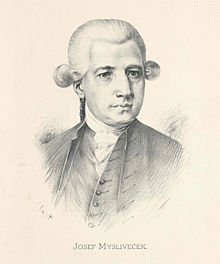La Calliroe

La Calliroe is an
Performance history
The opera was first performed at the
Roles
| Cast | Voice type | Premiere, 30 May 1778, Teatro San Carlo, Naples |
|---|---|---|
| Agricane | tenor | Giovanni Ansani |
| Calliroe | soprano | Giuseppa Maccherini Ansani |
| Tarsile | soprano castrato | Luigi Marchesi |
| Arsace | soprano castrato | Pietro Muschietti |
| Briceste | soprano | Gertrude Flavis |
| Sidonio | soprano | Antonia Rubinacci (in a breeches role) |
Vocal set pieces
Act I, scene 1 - Aria of Tarsile, "Se fedel mi serba il fato"
Act I, scene 2 - Aria of Agricane, "Son guerriero e sono amante"
Act I, scene 4 - Aria of Sidonio, "Del tuo diletto del caro oggetto"
Act I, scene 5 - Aria of Calliroe, "Se dal cielo amiche stelle
Act I, scene 6 - Aria of Briceste, "Perder l'oggetto di un grato amore"
Act I, scene 8 - Cavatina for Agricane, "Care pupille belle"
Act I, scene 9 - Aria of Arsace, "Dalla fatal procella"
Act I, scene 10 - Accompanied recitative for Calliroe and Tarsile, "Ah no, Tarsile"
Act I, scene 10 - Duet for Calliroe and Tarsile, "Serena quei rai"
Act II, scene 1 - Aria of Sidonio, "So che fù troppo audace"
Act II, scene 8 - Accompanied recitative for Tarsile, "In tanto almeno"
Act II, scene 8 - Aria of Tarsile, "Parto, ma in questo addio"
Act II, scene 10 - Aria of Briceste, "Son tra notturni orrori"
Act II, scene 11 - Accompanied recitative for Calliroe, "In van ragioni"
Act II, scene 11 - Aria of Calliroe, "Tergi, o caro, il pianto amaro"
Act II, scene 13 - Aria of Arsace, "Vada, si, in campo armato"
Act II, scene 14 - Aria of Agricane, "Odo le mestre voci"
Act II, scene 15 - Accompanied recitative of Tarsile, "Che risolvi Tarsile?"
Act II, scene 15 - Aria of Tarsile, "Mille cose in un momento"
Act III, scene 1 - Aria of Calliroe - "Ritorna nell'alma il dolce sereno"
Act III, scene 4 - Aria of Agricane, "Da cento affanni e cento"
Act III, scene 7 - Aria (Rondò) of Tarsile, "Volgi ridente, o cara"
Score
The complete score of La Calliroe is available for study online on the Italian website Internet Culturale in the form of a reproduction of a manuscript once in the possession of the Teatro San Carlo of Naples.
References
- Freeman, Daniel E. Josef Mysliveček, "Il Boemo." Sterling Heights, Mich.: Harmonie Park Press, 2009.
External links
Complete score in manuscript available for viewing and downloading at http://www.internetculturale.it (Subcategory: Digital Contents)
